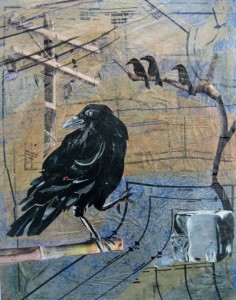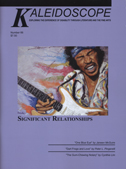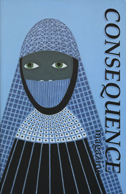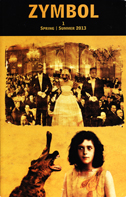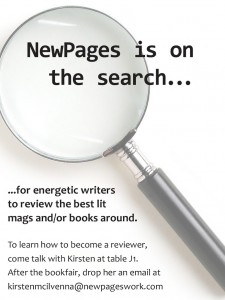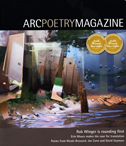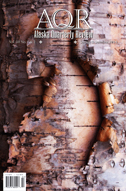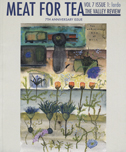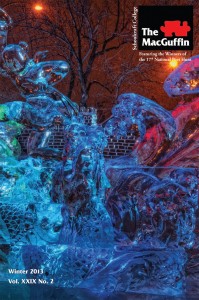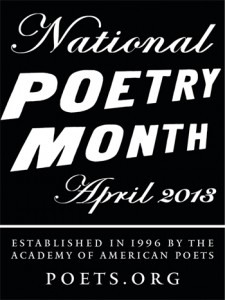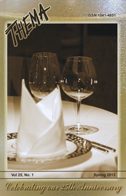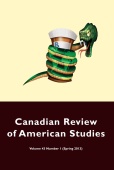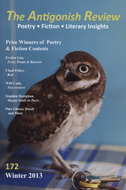Picking up this issue of Beecher’s Magazine is like sneaking into a speakeasy and becoming part of a very cool, very exclusive club. The gray cover of the perfect-bound journal is distinguished by a gold squiggle and a round cut-out that only reveals the issue’s number. It seemed to me that the whole Beecher’s team was on the same gold-edged page; the fiction, nonfiction, poetry, and art chosen by the editors is just as mature and inviting as the journal’s design. Continue reading “Beecher’s Magazine – Spring 2012”
NewPages Blog
At the NewPages Blog readers and writers can catch up with their favorite literary and alternative magazines, independent and university presses, creative writing programs, and writing and literary events. Find new books, new issue announcements, contest winners, and so much more!
Chtenia – Winter 2013
Before reading Chtenia: Readings from Russia, my only experience with Russian literature was in college, where I read Chekov’s “The Lady with the Dog” and Gogol’s “The Overcoat.” I fell in love with these stories and realized that I needed more Russians in my life. Chtenia satisfies with its wonderful selection of fiction, poetry, and essays from Russian authors both past and present. The winter 2013 issue is a special treat because it is dedicated to all things dark and scary in Russian literature. Senior Editor Tamara Eidelman writes: Continue reading “Chtenia – Winter 2013”
Spread the word!
Cold Mountain Review – Fall 2012
Appalachian State University’s Department of English publishes Cold Mountain Review. The western North Carolina institution is located in the Blue Ridge Mountains, in the town of Boone, and, yes, the town was named after Daniel Boone. His pioneering and exploratory spirit persists in the editorial stance of Cold Mountain Review, which is “interested in the way contemporary literature is testing the boundaries of genre” and “features work intended to transport the reader to unexpected landscapes—emotional terrains that are sometimes joyful, occasionally disconcerting, always interesting.” Continue reading “Cold Mountain Review – Fall 2012”
Spread the word!
draft – Fall 2012
I’ll be honest: revision is not my favorite part of the writing process. (I like to think I did it right the first time, even though that’s clearly not the case.) draft is special because it occupies an interesting place in the literary journal scene. Instead of rewarding the polished version of stories and poems with publication, the journal rewards the process by which writers make their good work even better. There are only two pieces in the journal: a short story and an excerpt from a book of poetry. Each piece is presented in an interesting manner: the final version is presented on the recto of each page, directly facing the draft version on the verso. Continue reading “draft – Fall 2012”
Spread the word!
J Journal – Fall 2012
One of the poems I keep coming back to in this issue of J Journal is Judith Skillman’s “Estrangement.” I like the care and precision with which this fierce poem about old age is constructed. I like its John Donne-like metaphors and the way it broadens out from the senses to far-flung and historical references; from “Long nights / sleepless, punctuated by sleet,” to “the city seven hours south of Paris // called L’Age . . .” to the “second century martyr Perpetua, / coming now into the arena / to be mauled by lion, hyena, and laughter.” And I like its seemingly tangential relation to this journal’s stated purpose—in the words of the editors, “to gather creative writing under the justice banner.” Read in any other journal, it might not trigger associations to questions of justice. But its inclusion here enriches it with an existential dimension—what is “just,” after all, about growing old? Continue reading “J Journal – Fall 2012”
Spread the word!
Jabberwock Review – Winter 2013
We all know the jabberwock, Lewis Carroll’s monster with its eyes of flame, riffling through the tulgey woods and burbling as it came. The story of the jabberwock “fill[s] [Alice’s] head with ideas—only I don’t exactly know what they are.” We might say that read-worthy literature is all like that, filling our heads with images and sounds whose meanings reach far beyond their mundane expression. I imagine that’s where the title of this journal, created by students and faculty of the Department of English at Mississippi State University, wants to point us: beyond our daily routines, into relevant, effective words that revise our ordinariness. Continue reading “Jabberwock Review – Winter 2013”
Spread the word!
The Manhattan Review – Fall/Winter 2012/2013
The history of millions in one cold breath, one empty train station, one terrifying silence. This issue of The Manhattan Review plants us in the aftermath of the Warsaw Ghetto Uprising and then attacks it mercilessly from the individual, not the statistical. Those who lived to deal with the silence, to inhabit neighborhoods forever changed, move on. Continue reading “The Manhattan Review – Fall/Winter 2012/2013”
Spread the word!
Mississippi Review – Winter 2013
The Mississippi Review, edited in Hattiesburg, printed in Brooklyn, and disseminated worldwide, does not accept unsolicited work, but its winter 2013 compilation is diverse, as though culled from every doorstep in this hemisphere, and the next. I found myself acutely aware of the language in the journal. You can have rich ideas but spare prose, and for me, when you have both you have discovered something rich and renewable. The takeaway is clear; buy two copies, so you can draw exclamations in the margin of one and keep the other pristine. Continue reading “Mississippi Review – Winter 2013”
Spread the word!
The New Quarterly – Winter 2013
How could one resist picking it up! Who, after all, could resist such a title? “The Disquiet of Men: in which we skirt tragedy, watch marriages wither, and seek direction while riding the rails.” Continue reading “The New Quarterly – Winter 2013”
Spread the word!
PMS poemmemoirstory – 2013
I hear women’s voices when I read this magazine. I should: this is a “140-page, perfect-bound, all-women’s literary journal published annually by the University of Alabama at Birmingham”; every voice is a woman’s. But I didn’t expect to feel such a bond, such a connection, and I was unexpectedly moved as I read: these writers know how I feel, they live my life, they speak my language. I teach fiction writing, so I went to the story section first. Every story made me smile with recognition and appreciation, and each one left an echo in my mind, an impression I carried around with me as I do with the best literature—a new way of perceiving my ordinary world, no longer ordinary, thanks to these women writers. Continue reading “PMS poemmemoirstory – 2013”
Spread the word!
A Public Space – Winter 2012
A Public Space showcases a splendid selection of stories that balance plot, pacing, and literary innovation without sacrificing what makes classic short fiction remain essential. From the first story in the volume, “American Lawn” by Jessica Francis Kane, to the last, a translation, “Something in Us Wants to Be Saved” by Patricio Pron, the reader glides through the narrative. There is enough drive in the stories, metered without sacrificing the thrall of language, to make you read endlessly, wanting to know the end, but letting the powerful pacing direct your review—allowing all truths in its own time. Continue reading “A Public Space – Winter 2012”
Spread the word!
The Sewanee Review – Winter 2013
War is a constant throughout human history. Even now as I write this review, North Korea is threatening all-out war with South Korea and the United States (even though they have technically been at war since 1953, but we won’t get into that). The latest issue of The Sewanee Review examines all the facets of war in its collection of fiction, poetry, and essays. From the battlefields of the distant past to the conflicts of today, the authors in this issue examine the heavy cost of war and the impact it has on those who survive. Continue reading “The Sewanee Review – Winter 2013”
Spread the word!
Southern California Review – 2013
All the bad, bad boys. You sort of wanted them to fraternize with each other—take the sociopath Greg from Erika Wurth’s short story “Freight Train” and introduce him to the Matthew/Luke character (trust me, they are merged in the story too) from Graeme Mullen’s memoir of creating a community art project, then place them under the suicidal tutelage of Ilya Leybovich’s eponymous ‘suicide artist’ flailing for good fortune in the Upper East Side. I wanted the characters to meet each other, and that is how you know that even the surreal ones are thoroughly alive. Continue reading “Southern California Review – 2013”
Spread the word!
World Literature Today – March-April 2013
World Literature Today always packs an exciting table of contents, one that makes me want to spring up off my couch and catch the first international flight. I see the shining achievement of WLT in the editors’ ability to balance what is innovative and cutting edge with what is well established and relevant. Its unique content distinguishes it from most mainstream literary magazines, giving it vitality and spunk. This special double issue treats photography as a modern narrative form. Featuring twenty-one photographers, the spread beautifully illuminates many intersections between literature and photography. Continue reading “World Literature Today – March-April 2013”
Spread the word!
Brevity – March 2013
Brevity Poetry Review publishes—what should be obvious from the title—short poems, all coming in at under 30 lines. Each issue puts forth just 10 of these short poems, giving more weight to each one. And this issue contains no mediocre poems; they are all worth reading. Continue reading “Brevity – March 2013”
Spread the word!
Ghost Ocean Magazine – January 2013
Ghost Ocean Magazine publishes some of the best poetry and short prose; as far as long prose goes, they say, “Just don’t waste our time.” Published on their website in an easy to navigate and read format, the writing feels cohesive, like it really does belong together under one roof. Continue reading “Ghost Ocean Magazine – January 2013”
Spread the word!
Spry – 2013
Spry is a new literary journal that claims to be a place “for people who excel at taking risks.” And certainly, even in their very first issue, they have succeeded with this. Continue reading “Spry – 2013”
Spread the word!
Star 82 Review – March 2013
Star 82 Review puts forth its first issue, filled with sections titled “Shorts,” “Postcard Lit,” “Art Post,” “Erasure Text,” and “Hidden Gems.” I wish this magazine well, because they are already publishing great work. Continue reading “Star 82 Review – March 2013”
Spread the word!
SWAMP – Number 12
SWAMP is an online magazine that exists to feature the writing from postgraduate creative writing students. Edited by postgraduate writers, it is a great community for these students. Continue reading “SWAMP – Number 12”
Spread the word!
Tongue – Winter 2013
Tongue doesn’t claim to provide any answers, to provide stories that reveal them, but the editors “revel, instead, in poems and art at ease with a kind of ambivalent vulnerability.” And as I read this issue, I certainly felt that. Continue reading “Tongue – Winter 2013”
Spread the word!
Writing Wanted: SWITCHEROO 2013
Writers, it’s time for Broadsided‘s annual Switcheroo, now in its tenth year!
Broadsided has posted two images online. Writers respond to the visual pieces in poetry or prose in a way that creates a relationship between art and literature and that fits with the Broadsided format. There are plenty of past years’ selections to see as well. The editors will read all submissions, and the winning entries (one for each piece of art) will be published on May 1, 2013 as a Broadsided collaboration.
Deadline: April 15, 2013.
Spread the word!
Kaleidoscope Goes Digital
In the editor’s note in Kaleidoscope‘s Issue 66, Gail Willmott announces that the magazine has been given two choices: go online only, or cease publication. There has been a whole-hearted decision to make it go digital. “To be honest,” she writes, “I have mixed feelings about this transition. For me part of the joy of completing each issue of the magazine has been holding the tangible, finished product in my hands.” However, we she found out the ultimatum, she chose to continue the magazine. “In truth there will be many positive developments as Kaleidoscope goes online. First, many more people will have access . . . Second, readers will be able to view all of the artwork in color rather than in black and white as is now the case . . . Third, it is my hope that without the cost of printing, there may soon come a time when we will not be strictly limited to 64 pages, which means making more of the excellent work of our contributors available to a much wider audience.” She wishes that readers will continue to read the magazine as it transitions to a digital form.
This current issue, themed “Significant Relationships,” features Janeen McGuire’s “One Blue Eye,” Peter L. Pingerelli’s “Dart Frogs and Love,” Cynthia Lim’s “The Gum-Chewing Notary,” and more.
Spread the word!
Consequence Prize in Poetry
Consequence features the winner of their prize for poetry in Volume 5. Selected by the judge Fred Marchant, Michelle Bonczek won for her poem “Aria.” Here is a small section of the poem:
I am reading this to you from a stage,
from a bathtub full of mineral salt, from a canoe
lost in the Pacific like a paperclip
holding a death certificate. I am reading this from a drop
of water, a sand speck sunk
to the bottom, a little island dome.
We are on Jupiter’s smallest moon, in a poppy,
in a bean field. We are sunflowers and a herd of cows.
This is a field of vision. It grew long before me, before
you. Before I walked for the last time
to the rail of my grandfather’s bed, away
for the first time from the rail of my daughter’s crib.
You can view the rest of the poem online here, or in Volume 5. The finalists include Jared Coffin for “Hollandia,” Dawn McGuire for “After Finding a Firefighter’s Ax at the Thrift Store,” Wesley Rothman for “White Flag,” and Danielle Sellars for “Thoughts From an Army Girlfriend.” The rest of the issue includes the work of David Abrams, Andrew Barlow, Stephen Dau, Bruce Felming, Peter Balakian, Martha Collins, Lee Sharkey, Paul Wasserman, and more.
Spread the word!
Birmingham Poetry Review’s 25th Birthday
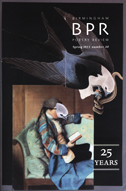 Birmingham Poetry Review celebrates 25 years with its Spring 2013 issue. It is a hefty issue with poets Adcock, Adkison, Ager, Anderson, Asekoff, Balbo, Brachman, Brewer, Collins, Davidson, Dawson, C. Doyle, J. Doyle, Dubrow, Emerson, Fabrizio, Fagan, Foster, Gottlieb-Miller, Hardin, Hartsock, Hirsch, Jenike, Jerrell, Jordan, Kirby, Levitin, Logan, May, McCullough, McLoghlin, McRae, McVicker, Meek, Meitner, Mintz, and many, many more.
Birmingham Poetry Review celebrates 25 years with its Spring 2013 issue. It is a hefty issue with poets Adcock, Adkison, Ager, Anderson, Asekoff, Balbo, Brachman, Brewer, Collins, Davidson, Dawson, C. Doyle, J. Doyle, Dubrow, Emerson, Fabrizio, Fagan, Foster, Gottlieb-Miller, Hardin, Hartsock, Hirsch, Jenike, Jerrell, Jordan, Kirby, Levitin, Logan, May, McCullough, McLoghlin, McRae, McVicker, Meek, Meitner, Mintz, and many, many more.
The featured poet, Claudia Emerson, shares her poems “Clearcut,” “Lightning,” “Third,” “Common House Sparrows at JFK’s International Terminal,” “Virginia Christian,” and “Apo
logue.” Following her poetry is an interview with Emerson, conducted by Susannah Mintz.
Spread the word!
Anderbo Poetry Prize 2012
Anderbo.comhttp://anderbo.com/ announces the winner of their 2012 Poetry Prize, judged by Sidney Wade. The contest assistant was Charity Burns.
Winner
Margaux Griffith for “Apple Galette”
Honorable Mentions
Grace Marie Grafton for “Rising”
Leland James for “What God in This Forest Dwells”
Julie Stuckey for “The Student”
All of these pieces can be read online, here.
Spread the word!
New Lit on the Block :: Zymbol
Zymbol is a new print magazine that publishes twice a year, in March and September, and welcomes all sorts of genres and forms. Editor Anne James says, “We’re happy to consider any genre or medium that the submitter feels belongs to, or shares a connection with, Symbolism or Surrealism. As an editor, I’d rather read three times as many submissions to find that amazing, description-defying piece than to miss out on seeing it because we’ve set our guidelines too strict.” However, because they are a print magazine, James says, “we can’t accommodate submissions of someone’s videotaped fire-eating homage to Salvador Dalí.”
In the issues you can expect to find a variety of writing. “We pride ourselves on the diversity of voices we publish,” says James, “and I don’t just mean in terms of demographics. We have everything from the whimsical to the downright sinister. Any reader who daydreams and questions reality can find a sense of camaraderie in the pages of Zymbol.”
The magazine gets its title from the way symbols are “the key in Symbolist and Surrealist works.” James says, “We wanted our name to pay homage to historical influences, while signaling a drive for the future, hence the ‘Z.’” James worked learning the industry at St. Petersburg Review with Elizabeth Hodges, “an amazing mentor and friend who showed [her] it’s still possible for an independent literary magazine to thrive.” James says that she feels there is a “vacancy in the world of art and literature for a publication that is both surreal and grounded in experience. Too much contemporary literature veers off into absurdity and flights of fancy, but what excites me is the absurd out of the commonplace, the magic and mystery in our minds and our realities.”
Along with James there is a student editor, Adria Holmes of Endicott College, along with Alex O’Fhailghigh, who has been helpful in defining the editorial focus, and Marta Ferrer, who helps with art submissions and helping recruit international contributors.
The first issue features art by Nuncio Casanova, Anastasia Hager, and Mette Norrie; an essay by Marta Ferrer Gómez; poetry by Carol Alexander, Flower Conroy, William Doreski, Lou Gallo, Anastasia Hager, Anne James, Natalie Kinsey, Anthony Madrid, Erin Lyndal Martin, Ben Nardolilli, Kevin O’Sullivan, Mary Ellen Phillips, Matt Schumacher, J.J. Steinfeld, Tim Suermondt, Allison Willard, and Bill Wolak; and fiction by Jennifer Hollie Bowles, Cary Groner, Zachary Kaplan-Moss, Larry Lefkowitz, Ilya Lyashevsky, John McCaffrey, Harry Posner, and Evan Morgan Williams.
While they are only available in print right now, they hope to develop an e-reader version as soon as possible. Along with that goal, they hope to “get bookstores and other venues enthusiastic about doing some wacky readings and performances, because there’s nothing like sharing an experience with a room full of people.”
Right now, they are looking for submissions that will match up with “what is shaping up to be a very dark and stormy Autumn/Winter issue.” James says this will be a nice contrast to the Spring/Summer issue. She advises that although they read year-round, submissions now through May have the best shot at getting into the next issue. They take submissions online through their website. But “if you have something crazy that the submissions manager won’t eat,” you can send it directly to James at [email protected].
Spread the word!
NewPages Reviewers
NewPages is still looking to add a couple more reviewers for both book reviews and magazine reviews. If you are interested, please check out this page for more information. Then send a message to Kirsten, kirstenmcilvenna[at]newpageswork[dot]com for magazine reviews or to Holly at hollyzemsta[at]newpageswork[dot]com for book reviews. Please pass along this information to anyone you think may be interested.
Spread the word!
Arc Poetry Magazine Staff Changes
The editor’s note in Arc Poetry Magazine announces a few changes in the editorial staff. Prose Editor Chris Jennings steps into his new role: “The title of prose editor may be new, but Arc has always had a ‘prose editor’ function usually handled by the Editor.” Additionally, former Coordinating Editor Katia Grubisic is thanked for her work and given a send-off. Jennings writes, “Those of you who know her know that she is tireless and professional, and we were proud to have her at the helm for the brief time we enjoyed the privilege. As with Anita Lahey and John Barton before her, we will take some solace in knowing that Katia the poet and writer will continue to participate in the Canadian poetry conversation.”
Stepping into her shoes is Robyn Jeffrey. Jennings says that “Robyn brings considerable experience in project coordination and organizational capacity to our operations, and we look forward to having her insight and talents on Arc‘s editorial team.”
Spread the word!
Alaska Quarterly Review: Two Novellas
The Spring & Summer 2013 issue of Alaska Quarterly Review features a special section for the place of two novellas. Included in this section are Cary Holladay’s “The Army Disease” and Christie Hodgen’s “Mistakes I Made.”
The issue also includes fiction by Ben Brooks, Matt Carmichael, Patricia Schultheis, Peter Gordon, Ihab Hassan, Catherine Bussinger, Emily Mitchell; nonfiction by Anne Kaier, Edward Hower, Mary Koral, and Leslie Ullman; and poetry by Matthew Westbrook, Joan I. Siegel, Kim Farrar, Carol Edelstein, Deborah Brown, and many more.
Spread the word!
Meat for Tea Anniversary
For seven years now, Meat for Tea has been putting forth issues. To celebrate, they have released a special “Lardo” issue, featuring the work of Micahel Alves, Elizabeth Macduffie, D. H. Yondernod, Meg Pokrass, Ben Bellizzi, Robert Joshua Mobley, John Sibley Williams, Gina Williams, Kirby Wright, Clare Haxby, David P. Miller, Loren Kantor, Richard E. Corrigan, John Lurie, Gina Marie Bernard, and many more. They also celebrate with creating a new style for the magazine: “Deciding it was time Meat for Tea grew a back bone, I have turned to a perfect bound format,” writes Meaty Gonzales, Editor-in-Chief.
Spread the word!
National Poet Hunt
The most recent issue of The MacGuffin features the winner of the 17th National Poet Hunt: Sharron Singleton for “Like a scrap of Michigan sky.” Judge Dorianne Laux says that she was hooked after the first line, saying “already a place, already an image, a tone.” She says that, “This is a poem to hold in our hands, to sing out loud.”
The honorable mentions go to Sophia Rivkin for “Lido Island” and Kevin Griffin for “Melt,” also featured in this issue alongside Rik Barberi, Carrie Callaghan, Jorge Casuso, Barbara Crooker, Justin Daughtery, Marti Dodge, Taylor Dowd, Kathleen Founds, Deborah Kent, Kent Maynard, Billy Middleton, Rex Richards, and many more.
Spread the word!
Happy National Poetry Month 2013!
From the Academy of American Poets:
It’s hard to believe that when the Academy of American Poets launched National Poetry Month in 1996, only a few hundred people participated. Today, it is the largest literary celebration in the world with special events taking place in thousands of schools, libraries, bookstores, and communities nationwide. Here are some ways to participate in National Poetry Month this year:
Sign up for Poem-A-Day, which delivers a new poem to your inbox every morning.
Spread the Word: Download the official 2013 National Poetry Month logo for promoting your poetry events this month. And, promote your events on our national Events Calendar.
Participate in Poem-in-Your-Pocket Day April 18.
Learn about what’s happening with poetry in your state by taking a looking at our poetry maps.
Or, consider one of these 30 Ways to Celebrate National Poetry Month in your community.
Spread the word!
NaPoWriMo is Here!
NaPoWriMo, or National Poetry Writing Month, is an annual project in which participating poets attempt to write a poem a day for the month of April.
NaPoWriMo was founded in 2003, when poet Maureen Thorson decided to take up the challenge (modeled after NaNoWriMo, or National Novel Writing Month), and challenged other poets to join her. Since then, the number of participants has gotten larger every year, and many writers’ organizations, local, national and even international, organize NaPoWriMo activities.
Anyone can “join”NaPoWriMo by simply writing a poem a day for the month – no need to sign up or agree to anyone other than yourself. Participants with websites are invited to submit their site for listing, and if you want to organize your own NaPoWriMo events in your area, Thorson says: “There is no licensing process or fee for NaPoWriMo. If you want to organize a group to participate, that’s great! If you set up a website for your group, you can submit it to be listed on this site.”
Spread the word!
THEMA’s 25th Anniversary
THEMA‘s Spring 2013 issue marks the magazine’s 25th anniversary. To celebrate, the theme is “White Wine Chilling,” and Editor Virginia Howard encourages you to “drink a toast to THEMA Literary Journal!”
What started as a game among friends in 1988 at a Chinese restaurant has now evolved into the popular themed magazine. “We would each write a story based on the fortunes printed in the fortune cookies received that day. We invited other literary friends to join us,” writes Howard. “This mental exercise turned out to be such a pleasure that it fueled our curiousity. How would other authors handle the same theme? And what about other unusual themes? . . . And how would various imaginations react to them? We had to know!”
Featured in this issue are D’Ann Gunn, Norbert Petsch, Dennis Trujillo, Corrine D’Italia, Debbie Okun Hill, Gary R. Hoffman, Lorraine Merrin, Marvin Thrasher, Sandra Storey, Elinor Davis, Susan Shaw Sailer, Norman Weddle, Ronald Edwin Lane, Judy Swann, J. F. Pierce, Stefanie Freele, James B. Nicola, and Suszanne Stuhaug,
Spread the word!
Incarnadine
Mary Szybist’s second poetry collection, Incarnadine, traces the ordinary and the divine in well-lit poems engaged in lyrical narrative. Although initially read as quiet, introspective meditations, these poems claim larger historical ground through interactions with and dissolutions of male-centric texts, including those of Nabokov, George W. Bush, and Byrd, and well-known female figures. With strong representations of Biblical female figures that further complicate the lineage and significance of women, specifically the Virgin Mary, Incarnadine leads the reader through a nuanced interpretation of gender roles and expectations. Continue reading “Incarnadine”
Spread the word!
The Hello Delay
Julie Choffel offers a warning at the start of The Hello Delay, winner of Fordham University Press’s 2012 Poets Out Loud prize: “my poetry has no camera.” Photographs tell stories; their tableaus create the “‘everyone crying’ scene” or the “‘everyone looks elsewhere’ scene” (“The Sorrows”). Still, in a photograph’s version of reality: “mud is paper mud / the sky has creases in it” (“The Rain Falls as a Cylinder”) or “the sand is never real sand, but some uncatapultable feeling of / sand” (“The Sorrows”). Besides a natural disconnect between the image and the physical object, photographs have their own contexts, back stories, and intrigues that make meaning depending on the beholder. When the speaker of “The Sorrows,” for instance, gazes at a photo of herself, she “can only see [her] own eyes / seeking their place” and not the whole of the composition. Choffel’s collection resists “easy combinations” and singular definitions. In fact, her photography metaphor informs how the collection thinks about language: exploratory, changeable, and exhilarating. Continue reading “The Hello Delay”
Spread the word!
Swallowing the Sea
“This is a book about ambition,” Lee Upton writes in the first section (aptly titled “Ambition”) of Swallowing the Sea. It would seem that Upton’s own ambition with this book is to discuss writing as a writer, and yet the book does so much more. For anyone in love with writing, Swallowing the Sea is an homage to the delicate, painful, and (for some) necessary impulse to write. Upton explores the process of writing, the hurdles and frustrations along the way, and the fervor of being an avid reader, while employing personal anecdotes, literary criticisms, and poetical metaphors to make sense of writing’s place in our culture. Continue reading “Swallowing the Sea”
Spread the word!
It Becomes You
Dobby Gibson’s newest collection, It Becomes You, is his third book of poetry. His poems remind me of Billy Collins or Mark Strand: conversational and witty with themes of nostalgia and doubt. At their best, they reflect the sharp humor of Auden, who makes tight lines appear effortlessly conversational. From W. H. Auden’s “The Unknown Citizen”: “Was he free? Was he happy? The question is absurd: / Had anything been wrong, we should certainly have heard.” Gibson’s best poems aspire to this same kind of detached philosophical clarity. He generally succeeds, but without the formal aesthetic pleasure. Continue reading “It Becomes You”
Spread the word!
American Dream Machine
Matthew Specktor’s new novel, American Dream Machine, is set in LA and spans the second half of the 20th century and the early years of the 21st. My mind has pop-ups when I hear about a book that takes place in LA—I think Chandler, Fante and Mosley, not to mention all those black-and-white noir films. Never having visited, I prefer to keep my perhaps faux-romantic ideas of this location rather than be disturbed by the actual reality of Los Angeles. So, I wondered, what will Specktor’s book add to my at-a-distance relationship to this fabled city? Continue reading “American Dream Machine”
Spread the word!
Out Across the Nowhere
In her debut collection, Out Across the Nowhere, Amy Willoughby-Burle tells vast and vibrant stories (fourteen of them) in a scant (ninety-three) number of pages. Think bright and miniature, resembling the fireflies in her title story: “. . . like all the stars have left the sky to come roost in the tree limbs.” Think of their impact and largeness, and they make us feel that “We could swallow them and make little galaxies in our empty stomachs.” Continue reading “Out Across the Nowhere”
Spread the word!
At the End of Life
The twenty-two essays in this collection were chosen from four hundred submissions in response to Lee Gutkind’s (editor of Creative Nonfiction literary magazine) call for essays on the subject of death. The book is a collaboration of Creative Nonfiction and the Jewish Healthcare Foundation. While it isn’t a book one would choose for entertainment or casual reading, it is an important one that offers an expansive view, from various perspectives, on how we deal with death and dying. Continue reading “At the End of Life”
Spread the word!
A Displaced Person
A Displaced Person: The Later Life and Extraordinary Adventures of Private Ivan Chonkin is the much anticipated finish of the Chonkin trilogy, told through a curious and unexpected Absurdist literary frame for our Russian protagonist. The story of A Displaced Person is fantastical dark satire of a Stalin-era Soviet soldier who manages to blunder his way from one adventure to another. This story, however, is also a wonderfully powerful philosophic commentary on the struggle for meaning in the confusing, conflicted experiences of a Russian Everyman. This detached existentialism that surrounds Private Chonkin throughout the narrative allows the author the opportunity for caustic commentary on Russian and Soviet moralism. Continue reading “A Displaced Person”
Spread the word!
In a World of Small Truths
Southern discomfort informs Ray Morrison’s short story collection In a World of Small Truths, yet the unease that permeates each story comes distinctly from the New South, nowhere near the traditional gothic trappings of Faulkner or O’Conner. Still, Morrison’s voice is that of an insider, often reflecting on a youth long gone, not unlike a more collective longing for those lost antebellum days. Continue reading “In a World of Small Truths”
Spread the word!
If a Stranger Approaches You
In Laura Kasischke’s first collection of short stories, she grabs you from the beginning, making you catch hold of your breath in anticipation. And I mean from the very beginning. The first line of the first story (“Mona”) reads: “They’d all warned her not to snoop.” Already, we are just as curious as the mother in her teenage daughter’s bedroom. What will she find? And in addition, what will we, as readers, find between the pages? This collection speaks of the unknown. What is your daughter hiding from you? What are the lives like for the people in the houses you pass by each day? What will happen when you grow up and are no longer a child? What lies ahead of you after death? And yet, what we find isn’t necessarily answers to those questions. I found arresting images, ones that allow both the darkness and the light to live within the same text. Continue reading “If a Stranger Approaches You”
Spread the word!
The Dinner
Dutch novelist Herman Koch’s The Dinner, a bestseller in Europe, is funny, intense and discussable for its morality. Two brothers and their wives meet at a topnotch Amsterdam restaurant to talk about their fifteen-year-old sons. One brother, Serge, is a politician, a shoo-in for prime minister, and the other, the narrator Paul, was a high school history teacher. At first the novel is funny due to Paul’s acerbic comments on the restaurant’s pretensions and his brother’s obvious love of being in the spotlight. But then when we learn of the crime perpetrated by Paul’s son Michel and Serge’s son Rick, and we learn more of Paul’s background, the book grips us with its surprises. Continue reading “The Dinner”
Spread the word!
Percival Everett by Virgil Russell
Percival Everett’s narrative model is vacillating like our thoughts, changeable as our awareness that inhabits the present as we are ever forced to find meaning by telling ourselves what is in front of us. Upfront in Percival Everett by Virgil Russell, Everett constructs the perch from which the book is written: “language was a great failure or deceiver . . . that it could not be trusted” because the Ontological Argument for God’s existence was logically, but not factually, sound. “A=A,” a logical proposition, is not the same as “A is A,” pointing at existence. Once we are in the territory of “is,” the otherness of life as its own force enters, and with the acknowledged unreliability of language comes a different kind of narrative than the narrative forms we have acclimated to in the modern era. All the techniques of postmodern narrative, a merged narrator of at least seven voices, intertextuality using literature elements from more than two thousand years, the narrative looking at the narrative as it is being written, nonlinear time, mix of high and low subjects, and varied writing styles are used to give us a story pointing beyond language . . . and Everett does accomplish this. The postmodern techniques, as deranging as they are, take a backseat to the “heart of the matter.” Yet the techniques let us experience our struggle for the incomprehensible knot it is. Continue reading “Percival Everett by Virgil Russell”
Spread the word!
A Disturbance in the Air
Michele Poulos’ debut poetry chapbook and winner of the 2012 Slapering Hol Press Chapbook Competition, A Disturbance in the Air, embodies a meditative, emotive lyric in finely crafted poems that deal with the complexities of interpersonal relationships. In examining lives through a historical veil, various speakers narrate and reflect on historical events surrounding Greece and other places, prompting the dead to speak and even return. Continue reading “A Disturbance in the Air”
Spread the word!
Robertson Prize
The Fall 2012 issue of Glass Mountain features the winners of the Robertson Prize:
Poetry Winner
Sam Coronado: “Pete”
Poetry Runner-Up
Sessa Kratz: “Issac and Abraham”
Fiction Winner
Heather Pedoto: “Imogene the Voodoo Queen”
Fiction Runner-Up
Daniel Chang: “The Slip”
Spread the word!
American Antiwar Poetry Examined
“Resisting Imperial Jouissance: The Transideological Line in Recent American Antiwar Poetry” by Dean Brink has been published in Volume 43, Number 1 /2013 of Canadian Review of American Studies: “This essay critically examines various strategies taken in the most compelling contemporary American antiwar poetry written against the occupation of Iraq. It finds both limitations, as many poets have succumbed to a postmodern distance from events, and brilliance, in poets who have discerned ways of eliciting hope in the aims of such poetry. Linda Hutcheon’s term transideological irony is used to show how many poets are complicit, in their irony, with rubrics of the dominant discourse such as ‘a nation at war.’ In light of Žižek’s Lacanian-Marxist formulation of jouissance, the imperial jouissance manifest in much poetry presented as thematically ‘antiwar’ is examined in terms of both successes and shortcomings.” The essay is available for purchase online as a PDF download.
Spread the word!
The Antigonish Review Contest Winners
The Winter 2013 issue of The Antigonish Review features the winners of the Great Blue Heron Poetry Contest and the Sheldon Currie Fiction Contest.
Great Blue Heron Poetry Contest
First Prize: Charles P. R. Tisdale
Second Prize: Kim Trainor
Third Prize: Laura Legge
Sheldon Currie Fiction Contest
First Prize: Veronica Ross
Second Prize: Fred Annesley
Third Prize: Joan M. Baril
The issue also includes work from Jocko Benoit, Dwayne Brenna, Jan Conn, Mark Corkery, Mike Donaldson, Aloys Fleischmann, Michelle Glennie, Sean Howard & Mark Silverberg, Kevin Irie, Edward Lemond, Lisa McLean, Jean McNeil, Mark Puhlman, and Reynold Stone.

